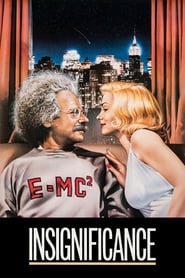The painting on the wall is Woman and Child on the Seashore by Pablo Picasso, painted in 1921 during his post-cubist neoclassical period. This is an apt choice of painting for The Actress to admire, not simply because it portrays a mother-child relationship that she cannot partake in, but that she presumably yearns to mend the shattering of her personality represented by Picasso's earlier cubist works and desires this more solid, almost majestic, style. Also, if there ever was such a thing as 'neo-cubist' film director, it would be Roeg.
Must be placed in that genre of "what a Brit thinks America is" movies that includes more contemporary films such as Civil War (2024). Insignificance does, of course, realise it's playing with then-mainstream pomo concepts of hyper-celebrity, but it wasn't especially pleasant to sit through so many tropes for that long. Still, it Definitely earns its stars in the last five minutes, even though, intellectually-speaking, it is as thuddeningly literal as the rest of the movie.
All this sport, to be sure, has specifically English inflections. These crazed American icons are being viewed from an amused and bemused distance, and much of the talk qualifies as fancy mimicry
— Jonathan Rosenbaum (Rejected essay for Criterion release)

